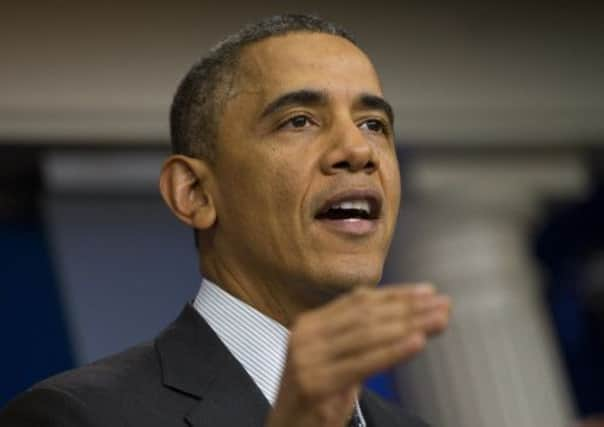Jane Bradley: Living in fear of the big red button


Actually, I don’t know if it is red. No-one does. For the details of this particular button have not been revealed – although they will be soon.
Last week, a federal court ruled that the Department of Homeland Security had 30 days to reveal details of its internet “kill switch” – a mechanism so called because it would, like that big switch next to the electricity meter by my front door, kill the network.
Advertisement
Hide AdAdvertisement
Hide AdPresident Obama has one, ostensibly to shut down wireless networks in a bid to prevent the remote detonation of bombs. It would also, supposedly, protect America against an impending cyber attack which could destroy companies’ networks and files.
While John F Kennedy’s or indeed his Russian counterpart Nikita Khrushchev’s big red button would have undoubtedly had more fundamental consequences, the effects of this new button would also be fairly catastrophic.
Imagine a world with no internet access. No mobile phones, no e-mail, no smart TV, no film streaming services. No incessant chat on Twitter, no daily requirement to showcase your wonderful life on Facebook. I can. For me it was about 1997 – before I went to university where I was given my first personal e-mail account and the world changed.
In 1997, it seemed fine – we all coped perfectly well. We managed to make arrangements using only landline phones, find out transport arrangements by looking up timetables in a paper book known as a timetable.
E-mail at that time was just for fun – it seemed entertaining to be able to keep in touch with friends in the holidays by typing a message rather than writing a letter or card – it was not a necessary part of daily life.
Now, however, it is. It is time to accept that the world is different and while those with a touch of the “in my day” about them might argue that we should be able to live without the internet, the truth is that it would be very difficult. Society is now geared up to function using the world wide web – and we have lost the ability and the tools to function successfully without it. Hence my fear of President Obama’s red button.
The switch has been in existence for the past three years without much fanfare. In 2010, the US government updated a 1942 law which allowed authorities to shut down “any facility or station for wire communication”. And it has not yet been used. But, like the original red button, there is always that underlying fear that it could be.
In the UK, such a switch does not yet exist – but even without such a thing in London or Edinburgh, one press of President Obama’s button would have a serious knock-on effect for the rest of the world.
Advertisement
Hide AdAdvertisement
Hide AdMajor search engines would lose the vast majority of their capacity, e-mail providers would shut down and European companies would be unable to do business with their American offices.
Google, Yahoo and YouTube, the world’s top three most visited sites, are all based in the US. So are Facebook, Twitter and LinkedIn. The web browser Internet Explorer is owned by Washington-based Microsoft.
Rumours have abounded in tech circles that there is also a global “kill switch” – one which could shut down the entire world’s internet and which could, theoretically, be the target of cyber terrorists.
Somewhat reassuringly, British internet founder Sir Tim Berners-Lee has claimed there is no way there could be a worldwide switch, pointing to the decentralised structure of the system. He insisted that to create such a thing, country leaders would have to get together to decide to centralise the system – something no sane leader would surely ever do. Surely.
I bet you’ve got a power cut emergency pack somewhere in your house. A box packed with candles, battery-operated torches and maybe, if you’re particularly organised, a couple of tins of baked beans.
Now is the time to become internet resilient. Take a second box and stash away a phone book, an encyclopaedia and a local train and bus timetable. Maybe even a couple of board games to while away the hours no longer spent playing Candy Crush or surfing Facebook profiles.
You might thank me for it some day.